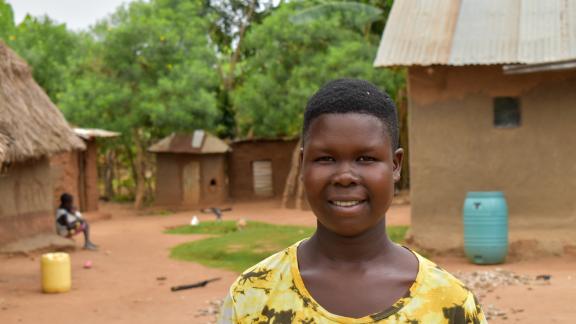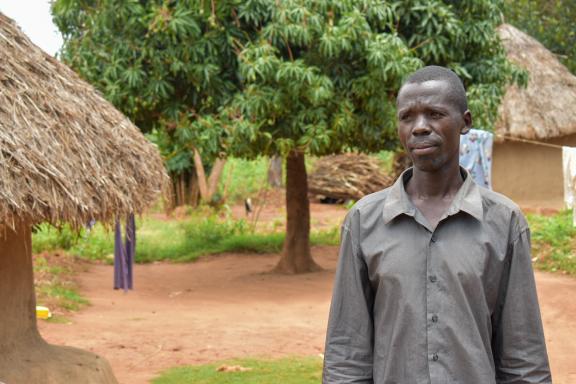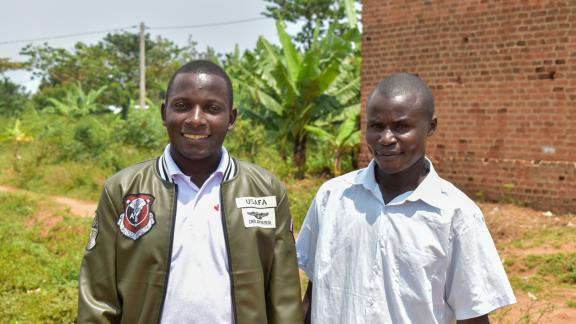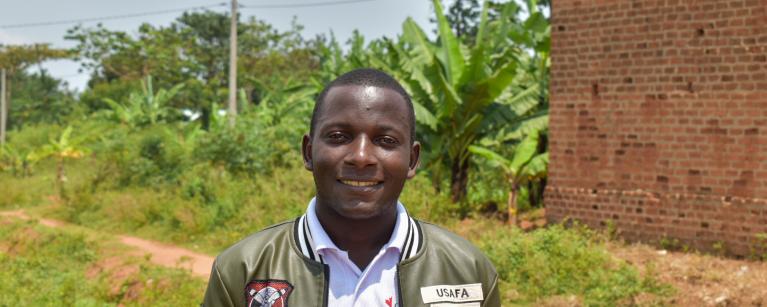Edwine Wangira, a 28-year-old from Sisiro village in Namayingo District, is locally known both as a shopkeeper and, humorously, as ‘Doctor’.” But Edwin isn’t a doctor by profession, he’s a peer educator trained by CEHURD.
Between running his retail shop that deals in household items, he also spends his time educating his community members about sexual and reproductive health and rights (SRHR). This is knowledge he acquired from CEHURD training such as the effects of child pregnancy and gender-based violence.
How Edwin supported Caroline and her husband
In one of the community engagements, Edwin and the other peer educators learnt about Caroline Nandera and her husband’s case.
Married at 17 years, Caroline could not conceive for three years. This created tension between her and her husband. The information had circulated in their village that Caroline was suffering from a spell of witchcraft causing her inability to conceive.
That was when Edwin and the other peer educators stepped in.. They visited Caroline’s home, sat down with her and her husband, and sensitised them about possible health issues that could have delayed their conception and the importance of medical checkups.
The couple began treatment, and within a few months, Caroline discovered she was pregnant, and five months later, their baby arrived, and joy returned to their home.

“They told us it was important to go to the hospital together. They referred us for testing, and we discovered we both had a sexually transmitted infection (STI), which had been preventing me from conceiving.”

The peer educator’s support for David Owino and his wife
In a different account, David Owino and his wife from Budala village in Namayingo district faced their own marital struggles. They have been married for ten years with four children. David was eager to welcome a fifth child.
“Our youngest was two years old. I thought it was the perfect time to have another baby, but my wife disagreed,” David says.
The disagreement caused them conflicts. One day, the peer educators visited their home to talk about family planning. They explained the importance of planning for children together as a couple.
“They made us understand that it wasn’t just about having children, it was about planning well for their future. After a long discussion with my wife, we agreed that she would start family planning for four years. After that, we could decide together if we wanted another child”
The peace has since returned to their home. “Our relationship is stronger now. I gave my wife the freedom to plan, which has made things easier for both of us. Child spacing helps us take better care of our children,” David shares.
Edwin’s work isn’t confined only in community engagement. On immunisation and antenatal days at Banda Health Centre III in Banda subcounty, Edwin and other peer educators speak to the young mothers and patients about the importance of antenatal care and accessing other SRHR services such as family planning, addressing cases of SGBV such as providing information on SGBV, referring to different service providers like health centres, police and seeking for psychosocial support and HIV testing.

Edwin Wangira and Sam, community peer educators in Banda Suncounty in Namayingo District
Every two weeks, the peer educators also convene for door-to-door sensitizations in communities, ensuring that no one is left behind, targeting the vulnerable households.
“We speak to about 50 households per visit. Sometimes, we gather in trading centres, or join community meetings, where the LC1 chairperson allows us to share. It’s not just us talking; it’s always a conversation, we exchange ideas with them and get to learn their perspectives.” Edwin shares.
Caroline also says that she now shares her story with close friends, though she still fears for their privacy. “But I want others to know that sometimes it’s not witchcraft. It’s just about seeking the right help,” Caroline adds.
“In Banda Sub-county, Oxfam, CEHURD, and Femme Forte have trained 21 peer educators who work with Edwin and sensitise communities on the issues of sexual and reproductive health and rights.”
The peer educators also share the referral pathways to SRH services for the communities. This is to ensure that survivors of sexual violence, people in need of post-abortion care, or support family disputes are channeled to the right authorities such as health officers, local district leaders or police.
Edwin is pleased to know that their actions are making a difference. He says that over time, the villagers have come to trust Edwin and his peers. They now call us doctors,” he laughs.
With funding from Global Affairs Canada (GAC), Oxfam, CEHURD, Femme Forte Uganda, and Reproductive Health Uganda and School of Public Health – Makerere University is implementing six and a half years Stand-Up for SRHR project. The project addresses key gender inequality and human rights issues, particularly harmful social norms, traditional harmful practices, and taboos regarding gender and sexuality; lack of adequate information on or access to comprehensive SRHR services; and lack of meaningful decision-making power by young women and girls regarding their health and sexuality. This project is implemented in Uganda, Mozambique, and Canada
